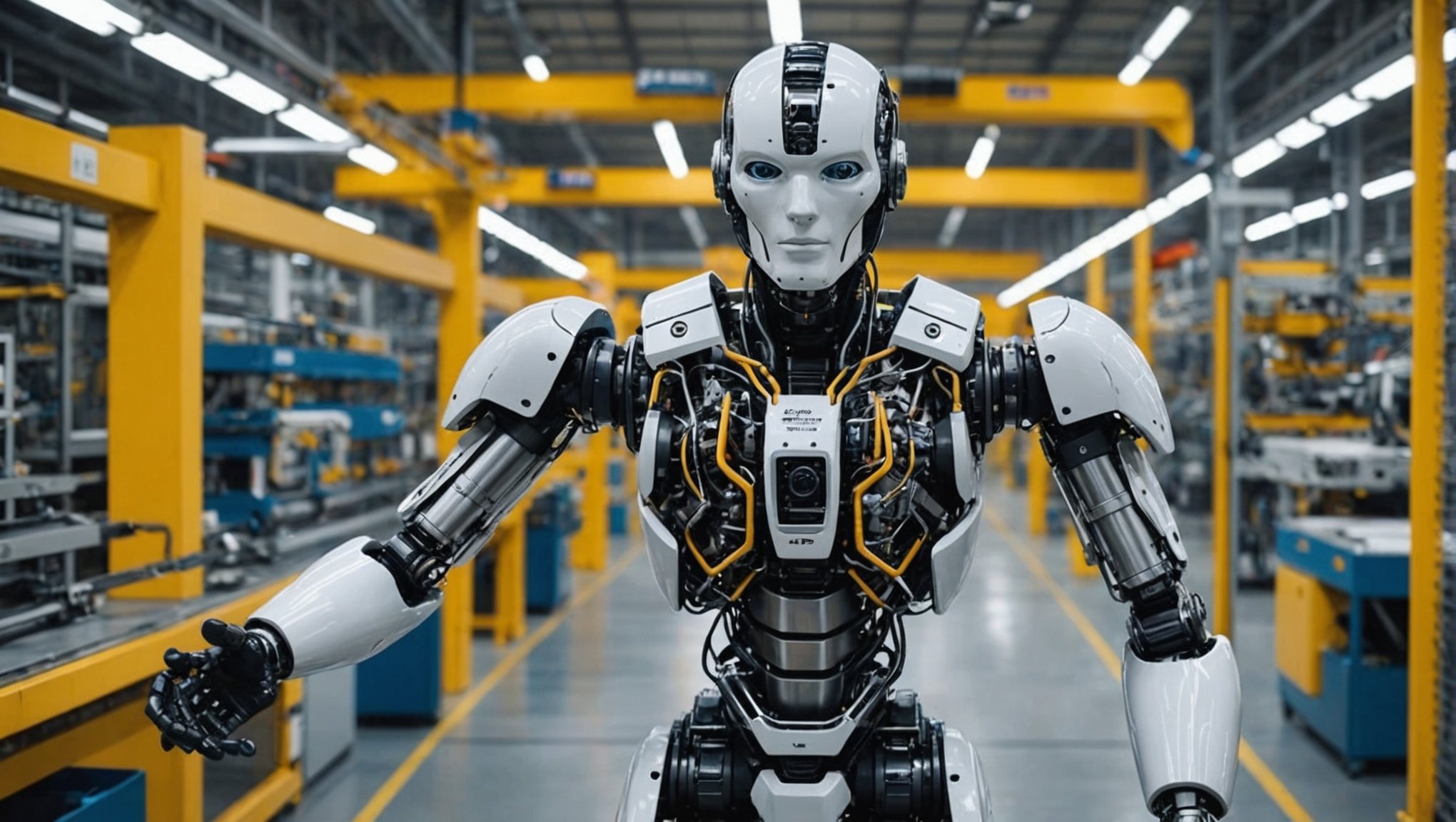The Role of AI in Manufacturing Efficiency
Artificial Intelligence (AI) has revolutionised the manufacturing sector, profoundly enhancing efficiency and streamlining operations. The deployment of AI in manufacturing spans a variety of applications. By integrating process automation, manufacturers achieve higher precision in production activities, minimising manual errors and cutting down on waste. Automation allows these processes to be executed rapidly, significantly boosting operational efficiency.
One of the primary ways AI is utilised is through predictive maintenance. By analysing equipment data, AI can forecast possible failures, allowing for timely interventions that prevent costly downtime. Furthermore, AI’s capability to optimise supply chain operations ensures resources are used judiciously, further improving efficiency.
Topic to read : Boosting Safety in Autonomous Public Transit: The Role of AI-Driven Algorithms
Real-world examples highlight the practicality of AI-driven process automation. For instance, automotive industries utilise AI-powered robots for assembly line tasks, reducing turnaround time and improving output quality. Likewise, AI systems in electronics production lines monitor quality control, identifying defects without human intervention.
AI not only transforms manufacturing processes but also reduces the environmental footprint. By lessening resource consumption and waste, AI applications align with sustainability goals, demonstrating their value beyond mere cost savings. As AI technology advances, its role in manufacturing will undoubtedly grow, offering even more innovative solutions.
Have you seen this : Revolutionizing Urgent Care: The Role of AI Diagnostic Tools in Accelerating Patient Assessments
Enhancing Supply Chain Management with AI
The application of AI algorithms in supply chain management has revolutionized the way companies approach logistics. At the heart of this transformation is the capacity for demand forecasting and inventory optimization. By analysing historical data, AI systems predict future demand with precision, allowing businesses to adjust their inventory levels proactively and minimize wastage.
Advanced AI logistics systems also facilitate real-time inventory management. These systems track stock levels, detect demand patterns, and alert businesses to potential shortages before they occur. The inclusion of AI in supply chain optimization ensures efficient resource allocation and improves overall operational efficiency.
Real-World Benefits of AI in Supply Chains
Implementing AI in logistics and delivery management has already seen fruitful results. Numerous case studies illustrate successful AI implementations. Companies report reduced delivery times, improved accuracy in delivery schedules, and enhanced customer satisfaction. Additionally, optimised inventory management results in cost savings and greater resilience against supply chain disruptions.
By leveraging AI capabilities, organizations can streamline processes, boost performance and remain competitive. Leveraging AI for supply chain optimization aids in efficient decision-making, allowing companies to adapt quickly to changing market conditions and meet customer demands meticulously. The shift towards AI in logistics promises a future of enhanced efficiency and sustainable supply chains.
Cost Reduction through AI Technologies
AI technologies are revolutionising the way businesses approach cost reduction. By implementing these cutting-edge solutions, companies can experience significant AI savings across various sectors. One notable area where AI has a profound impact is in supply chain operational costs. With AI, companies can optimise logistics, predict demand more accurately, and manage inventory with greater efficiency. This results in reduced wastage, decreased storage costs, and more streamlined transportation logistics.
Moreover, the long-term ROI considerations when utilising AI are incredibly promising. While initial implementation of AI systems might require substantial investment, the potential return is undeniable. AI systems can enhance decision-making processes and minimise the risks associated with human error. These improvements, coupled with the operational efficiencies AI provides, contribute to a positive return on investment over time.
Businesses aiming for sustainable cost reduction should focus on these AI-driven approaches. With ongoing advancements, AI continues to offer innovative solutions that reduce expenditures, streamline operations, and ultimately bolster financial health. Investing in AI not only promises immediate cost savings but also secures a robust foundation for future growth and innovation.
Challenges in Implementing AI Solutions
Implementing AI solutions in real-world environments presents several AI challenges, especially in manufacturing. One significant hurdle is the integration difficulties that arise. Connecting AI systems with existing technology infrastructure can be complex. Systems often require significant customization. AI solutions must be meticulously tailored to match the unique needs and equipment of each company, which can be a time-consuming process.
Additionally, there’s often a knowledge gap among the current workforce, presenting a workforce adaptation issue. Many employees may need to develop entirely new skills in order to effectively work alongside AI. Addressing these skill gaps is crucial. Workforce upskilling programs are essential to ensure employees are not left behind and can leverage AI tools’ full potential. Businesses might invest in training sessions tailored to bridge these gaps, fostering an environment of learning and adaptation.
Overcoming these challenges requires a strategic approach. Developing a clear plan that encompasses technology integration, workforce training, and ongoing support is vital. Collaboration between IT specialists, management, and employees can help streamline this process. Through consistent communication and support, organizations can successfully navigate the roadmaps of AI integration.
Future Trends in AI and Supply Chain Management
In the ever-evolving realm of supply chain management, the future of AI promises significant transformations driven by emerging technologies. One of the key supply chain trends involves the integration of predictive analytics that utilise AI to forecast demand more accurately, thereby optimising inventory levels. This shift not only enhances operational efficiency but also reduces costs by minimising overproduction and excess inventory.
Technological advancements in AI are also paving the way for autonomous systems. Imagine fully automated warehouses where AI-powered robots handle logistical tasks, improving speed and reliability. Such advancements underscore the importance of continuous innovation, enabling businesses to remain competitive in an increasingly dynamic market.
Predictions for the future role of AI in manufacturing suggest an increased reliance on machine learning algorithms to streamline production processes. AI can analyse patterns in data to identify inefficiencies, predict machine failures, and recommend preventive maintenance. This proactive approach minimises downtime and maximises productivity.
The need for ongoing adaptation cannot be overstated as AI technologies continue to evolve. Companies must stay vigilant, embracing these innovations to harness their full potential. By doing so, businesses future-proof their operations, ensuring resilience against the inevitable challenges the future holds.
Practical Tips for Adopting AI in Supply Chains
Incorporating AI into supply chains can significantly improve efficiency and decision-making processes. To effectively navigate this transition, consider the following practical steps. Begin by assessing your current system’s needs and identifying clear objectives for AI implementation. This clarity will guide in selecting appropriate AI tools tailored to your requirements.
Next, it’s critical to focus on best practices for tool and partner selection. Prioritise solutions that integrate seamlessly with existing infrastructure and offer scalability. Collaborating with reputable partners experienced in supply chain AI adoption can provide valuable insights and support throughout the process.
For sustainable success, invest in resources for ongoing learning and adaptation of evolving AI technologies. Encourage your team to stay informed through workshops, online courses, and industry forums. This will foster a culture of continuous improvement, ensuring your organisation remains ahead in the competitive landscape.
Furthermore, don’t overlook the importance of data quality management. High-quality data is crucial for the effective functioning of AI systems, ensuring the accuracy and reliability of outputs. By systematically applying these strategies, businesses can harness the transformative potential of AI, thereby enhancing operational efficiency and gaining a competitive edge in their supply chains.
















